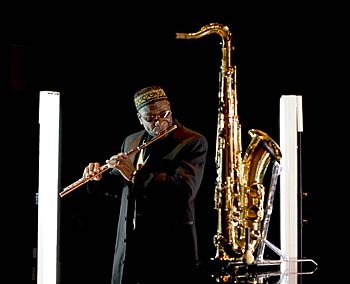HISTORY
Festival of Global African Music 2003 Festival of Global African Music 2002
Cornell University Lab Ensembles 1992–2000
From the UCSC Festival Director:
Festival/Conference History and Purpose
Since the 1970s, Karlton Hester has organized numerous festivals, symposia and smaller and invited world-renowned visiting guest artists and speakers. Events ranged from early Southern California concerts featuring jazz masters such as Buddy Collette and Louis Jordan with student ensembles and festivals (with guest musicians and "jazz" legends such as Toshiko Akiyoshi, Gary Burton, Jackie Byard, Dr. Donald Byrd, Joe Chambers, Chick Corea, Adela Dalton, Joyce DiCamilla, Akua Dixon, Wendell Harrison, Jimmy Heath Joe Henderson, Wynton Marsalis, Joshua Redman, Cecilia Smith, Billy Taylor, Cecil Taylor, Charles Tolliver Steve Turre, Stanley Turrentine, McCoy Tyner, and Pamela Wise). Some festivals also include symposia with paper presentations, workshops and panel discussions. At Cornell University Hester was the founding director of the Annual Cornell University "Jazz" Festival (presenting 9 festivals between 1990s and 2000). At the University of California, Santa Cruz, he started the Global African Music Festival Series (2002 & 2003).

This year’s co-sponsored festival & conference of improvised, cross-cultural and interdisciplinary music and arts festival is made possible by the generous support of the Porter College Festival Funding and other sponsors. It is a continuation of the Global African Music Festival series and involves collaboration between the International Society of Improvised Music and the UCSC Rebuilding Global Community through the Arts.
The idea of the 2009 festival/conference is to examine and involve a wide range of concepts with regards to improvisation, diversity and change through a wide range of cultural demographics, artistic styles and approaches, as well as wide-ranging concepts and discourse. Improvisation, “jazz” and spontaneous composition all require both high degrees of technical expertise and the abilities to invent, adapt, and respond in often-unpredictable situations, musical improvisation embodies core qualities of human creativity and over time cultivates the development of important aptitudes in the contemporary world. Diversity and improvisation prevail throughout the universe. The history of the most advanced cities and civilizations that humanity has produced demonstrate that great knowledge and cultural enrichment evolves from human diversity. Music has served as a model of diversity’s potential. It is important that the arts represent diversity on all levels of engagement if it is to demonstrate strong leadership in the evolution of world culture. This means a coming together of diverse communities of people and principles.

When I arrived for my job interview at the University of California, Santa Cruz, I became immediately aware of the paucity of diversity on campus and around the Santa Cruz area. It was also clear, given the generally high level of interest in non-Western music in the area, that Afrocentric music could have some impact on the current efforts towards diversification and cultural enrichment at UCSC and in town. Ideally, I figured, music at the university could have an effect on the Santa Cruz community at large. Such a musical project also seemed to merge perfectly with other current plans we were evolving to Rebuild Global Community through the Arts.
The Santa Cruz Global African Music Festival was a result of a cooperative effort from UCSC and community individuals and programs. I initially discussed the possibility of presenting an annual Festival of Global African Music with the Arts Division dean (Edward Houghton) and the Music Department Chair (David Cope, at the time) on campus. Both gentlemen were excited about the prospect. Next I visited my friend Tim Jackson at the Kuumbwa Jazz Center in Santa Cruz. Tim offered his ideas, support and cooperation.

